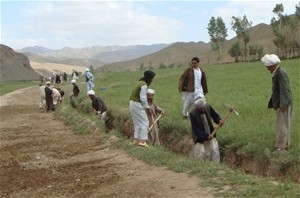
Ghor residents gravel a road and dig a drainage ditch to prevent flooding. Improved roads allow better access to markets, schools, and clinics.
USAID/FIRUP/Hilda Grigorian
Cash-for-work program provides temporary employment and allows villagers to rebuild their own communities.
30 NOVEMBER 2009 | CHAGHCHARAN, GHOR PROVINCE, AFGHANISTAN
Ghor province lies in the central highlands of Afghanistan, remote and lightly populated. Its self-reliant population of 615,000 is accustomed to harsh winters and the isolation that results from road closures. With rich pasturelands, livestock is the chief source of income. However, the need for external support became more pronounced due to returning refugees and high global food and fuel prices.
To assist residents of Ghor, USAID is conducting a cash-for-work program designed to reduce the potential for instability caused by the spike in food prices. The program provides temporary employment and salaries to benefit the lives and livelihoods of workers and their families.
Participants are employed in short-term public works projects, including urban clean-up, irrigation canal cleaning, road rehabilitation, snow removal, flood protection, and reforestation. These basic infrastructure improvements will have a long-term impact, as improved roads, irrigation, and forests will increase agricultural output and trade for years to come.
Since the project began in Ghor in spring 2009, local residents have cleaned 152 km of main irrigation canals and rehabilitated and graveled 58 km of road. In addition, women are benefitting from a tailoring program that provides income and training as they produce uniforms for school girls from grades one through six. In total, the program has employed 1,464 Afghans in Ghor.
The workers are excited to discuss their participation in the project and how it has helped their families. One man explained, “We are working hard to clean this canal to bring more water for irrigation and increase our crop production. We start before sun and finish in dark. We are happy to do this job to improve irrigation for our crops and also get paid for our work… it makes us feel good.”
“Not only do we earn a sustainable living, we also rebuild our community,” another participant commented. With help from the U.S. Government, Afghan citizens are playing a role in the development of their country.







Comment
Make a general inquiry or suggest an improvement.